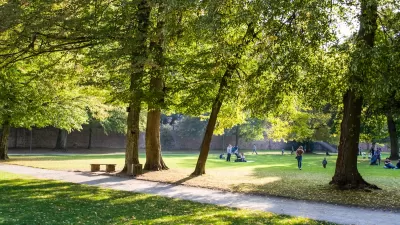Carbon dioxide is one of the most widespread greenhouse gases produced by humans. Trees can absorb it, but release it when they die. Scientists are looking to build artificial trees to do the job permanently.
"Trees can take CO2 back out again-but even covering the planet with forests wouldn't solve our problem, and there would be an awful lot of wood to preserve. (If allowed to rot or burn, trees release their carbon again.) Physicist Klaus Lackner thinks he has a better idea: Suck CO2 out of the air with 'artificial trees' that operate a thousand times faster than real ones.
They don't exist yet, and when they do, they probably won't look like real trees. But in Lackner's lab at Columbia University he and colleague Allen Wright are experimenting with bits of whitish-beige plastic that you might call artificial leaves. The plastic is a resin of the kind used to pull calcium out of water in a water softener. When Lackner and Wright impregnate that resin with sodium carbonate, it pulls carbon dioxide out of the air. The extra carbon converts the sodium carbonate to bicarbonate, or baking soda."
The artificial trees could absorbs the carbon dioxide, but only hold it until it is removed for proper disposal, another as-yet-unanswered question.
FULL STORY: Scrubbing the Skies

Maui's Vacation Rental Debate Turns Ugly
Verbal attacks, misinformation campaigns and fistfights plague a high-stakes debate to convert thousands of vacation rentals into long-term housing.

Planetizen Federal Action Tracker
A weekly monitor of how Trump’s orders and actions are impacting planners and planning in America.

In Urban Planning, AI Prompting Could be the New Design Thinking
Creativity has long been key to great urban design. What if we see AI as our new creative partner?

King County Supportive Housing Program Offers Hope for Unhoused Residents
The county is taking a ‘Housing First’ approach that prioritizes getting people into housing, then offering wraparound supportive services.

Researchers Use AI to Get Clearer Picture of US Housing
Analysts are using artificial intelligence to supercharge their research by allowing them to comb through data faster. Though these AI tools can be error prone, they save time and housing researchers are optimistic about the future.

Making Shared Micromobility More Inclusive
Cities and shared mobility system operators can do more to include people with disabilities in planning and operations, per a new report.
Urban Design for Planners 1: Software Tools
This six-course series explores essential urban design concepts using open source software and equips planners with the tools they need to participate fully in the urban design process.
Planning for Universal Design
Learn the tools for implementing Universal Design in planning regulations.
planning NEXT
Appalachian Highlands Housing Partners
Mpact (founded as Rail~Volution)
City of Camden Redevelopment Agency
City of Astoria
City of Portland
City of Laramie





























